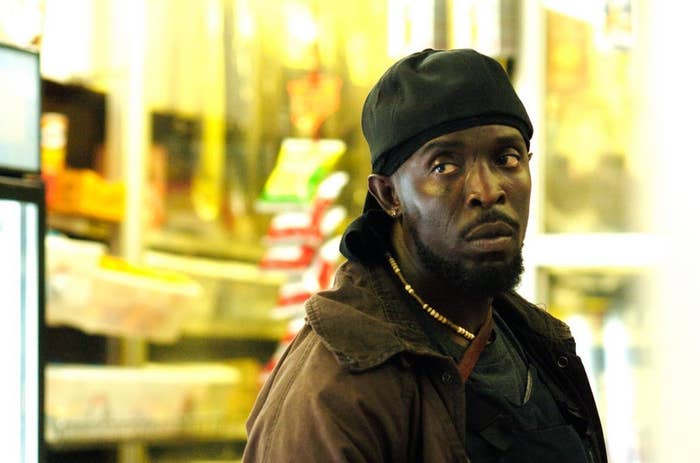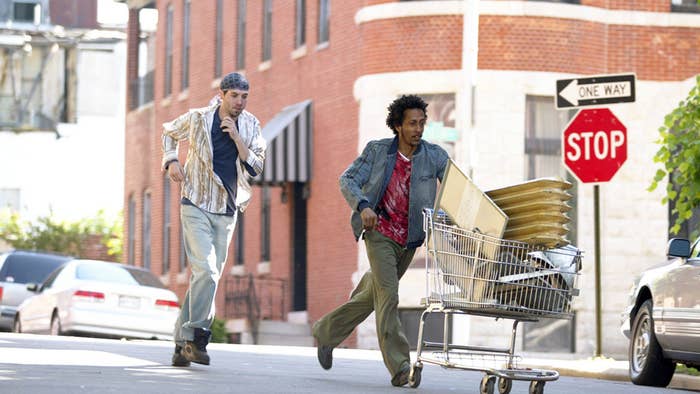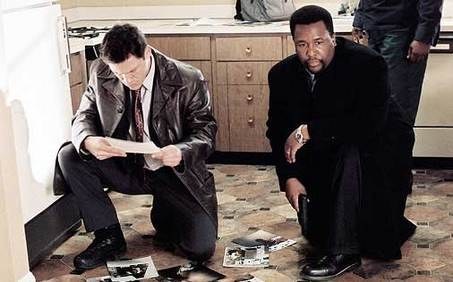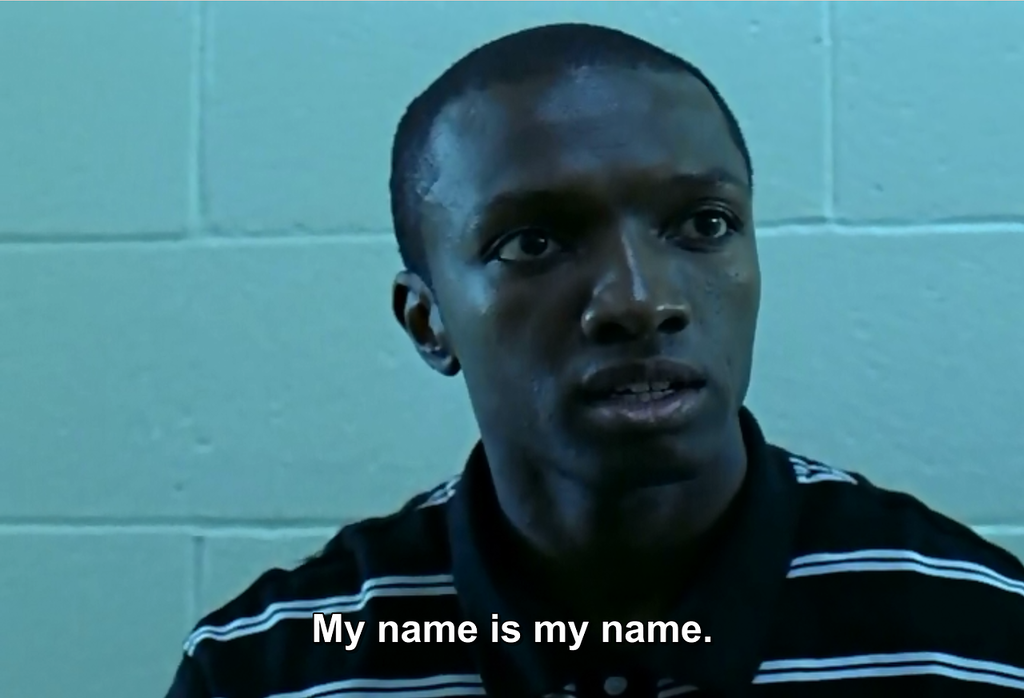
In the summer of 2003, Andre Royo, known to fans of HBO's The Wire as recovering heroin addict and Baltimore police informant Bubbles, was standing in a buffet line fixing himself a plate at a party for the premium cabler in New York, when he saw Mark Wahlberg making his way toward him.
At the time, the middle of the second season of The Wire was airing, and the actor was at the event to toast the launch of another HBO series, Entourage, which Wahlberg produced.
"I was like, oh shit! Mark Wahlberg's coming up to me!" Royo told BuzzFeed News via phone, recalling the glint of familiarity in Wahlberg's eyes. "And he came up to me, and he was like, 'Hey, you've got a good job now. I hope you appreciate your position right now. You better stay clean and take advantage of this moment.'"
Royo was momentarily confused. "I'm like, 'What are you talking about? I'm an actor. I've been doing theater for a little while.' And he was like, 'Oh, I'm sorry. I thought you was a real junkie. I thought they found somebody on the street and they gave him a part. My bad,'" Royo remembered. "He definitely took a step back."
Wahlberg's mistake was genuine — and common. By that time, fans of The Wire knew that creator David Simon often mixed real-life people into each episode, including some addicts, former drug dealers, cops and politicians — some were extras, others had a couple of lines. And that ultimately made Royo and his Wire colleagues feel accountable. "I felt like, I have to tell this story the right way, because this motherfucker is standing right next to me. And I'm not trying to make fun of this motherfucker. I'm trying to tell his story," Royo said. "So, you know, I think Wahlberg just thought I was one of those guys they found in Baltimore and gave me a job."
Ultimately, Royo took Wahlberg's confusion as a sign that, clearly, he was doing something right: He knew then that he was turning out the authentic performances he strived to bring to the screen.

But that also was the problem with the series, which ran on HBO for five seasons, from 2002 to 2008. It was gripping, but it gut-punched viewers in a way that perhaps no other TV show had done at the time. It was too real. It played out like a reality TV show you desperately wanted cancelled. It was ahead of its time. Unlike other cop dramas, The Wire wasn't a procedural, nor was there the promise of a happy ending, tied up in a nice pretty red bow. The Wire was the kind of show that was scarier to watch than the nightly news.
Though it was that type of authenticity that made The Wire one of the greatest shows on TV, it also hindered the series's success. At its peak, The Wire was able to grab 4 million viewers, but by Season 5, it dipped below 1 million.
Now, however, audiences have another chance to see the series that was perhaps born and gone too soon. HBO is bringing back The Wire this week with a marathon of a remastered HD cut that will air on HBO Signature. Starting Friday, Dec. 26, one season will air per day, and the complete series will be available to purchase on Digital HD on Jan. 5 and on Blu-ray sometime next summer.
But Royo understands why people didn't tune in during The Wire's original run. "When I come home, I don't want to see my misery, you know what I mean? When I turn the TV on, I want to escape my problems. I want to be entertained. TV is called the idiot box for a reason. I don't want to see the bleak and the problems that I go through every day," he said. "I think people were too engulfed by seeing such honesty, you know? They want to laugh — they want to have a sitcom. They want to see somebody else's story."
Though The Wire was set in Baltimore, it felt familiar to many viewers nationally: The struggles reflected in the series easily could have happened (and quite frankly, are still happening) in many other major cities in urban decay. To others who couldn't relate, The Wire was a glimpse into a saltier side of life, leaving no angle untouched. In a crime show, audiences are used to seeing that, ultimately, the bad guys get their due. But that rarely happened on The Wire.
"People want good news," actor Jamie Hector, who portrayed The Wire's most menacing drug dealer, Marlo Stanfield, told BuzzFeed News in a phone interview. "People watched and were like, can a dude like Marlo really exist? Yeah. He can. He's a sociopath. And that was scary."

In mid-October, much of The Wire cast gathered at the 2nd Annual Paley Festival in New York for a reunion. The running narrative that night was how, because no one was watching the series at the time it was on the air, they had a chance to really push the envelope and tell unexpected stories without much pushback.
In an interview with BuzzFeed News, actor Michael K. Williams, who portrayed Omar Little, perhaps one of the greatest TV characters ever written, agreed with that sentiment.
"What we set out to do was show you what's really going on in major cities in America," Williams told BuzzFeed News. "It was real. I tell people in that time, if in my face it looked like Omar was someplace that he might have smelled something dead, it probably was. We went into real abandoned homes to shoot a lot of my scenes, and we were really in the hood. They were not sets. None of those places were built. We went to real neighborhoods and the community and shot my scenes. All of that lends to the realness of what it looked like."
That level of authenticity was mind-blowing, giving The Wire a documentary feel, even though the plotlines were fictional. It was almost as if viewers were getting a behind-the-scenes look at life on the force as well as life on the streets.
The stories also felt overwhelmingly black, considering the time and space within which the series was set, but The Wire did a magnificent job at contrasting the central issue: class and circumstance.
"People weren't ready to see that this wasn't a black and white story," Royo said. "It was a universal, middle-class story. It was never about race, it was about the class system, and I think that people didn't catch on to that. They just thought it was a basic cop show with good guys and bad guys. But if you look at the show at the time it came out, it just had a different tone. It had a different landscape of storytelling. At the end of the day, the bad guy wasn't caught. This was nothing like Law & Order or CSI where it's wrapped up at the end. Our endings left you more confused than the beginning. You have to stick out and watch not one episode, not two, you have to watch the whole season to get it."
That points to another gripe fans of the show — and those who worked on it — have: Why didn't The Wire ever get nominated for any major awards? Royo points out that as far as judging committees go, shows can only submit three episodes for most awards. But with a show like The Wire, it's virtually impossible to watch out of context. Simon's crafty series was such that a small unseen nugget from Season 2 would play a major role in the final season. Almost nothing was a throwaway moment.
"We weren't getting the numbers and we weren't getting the nominations. We were a little salty. We were a little salty every year. The Golden Globes, SAG, the Emmys. Nothing," Royo said.

Instead, the best testament to how well done The Wire is comes from the remarkable afterlife it's had. Wendell Pierce, who portrayed homicide detective William "Bunk" Moreland on the series, said that he often hears from latecomers who discovered the show long after it was canceled.
"One time, I was with Andre Royo recently, and we were coming out of a bar and this guy started screaming, 'Oh my god! You don't understand! Literally, I just finished the last episode! I'm walking out of my apartment after turning off the television after days of watching five seasons of the The Wire and then I run into you guys!" Pierce recalled to BuzzFeed News. "And those moments happen all the time."
But HBO's decision to release a remastered HD cut doesn't signal that a long-whispered-about prequel might be coming, though Pierce is still hopeful that creator Simon might change his mind about that.
"I had spoken with Samuel Jackson, who is a fan of the show, and he was like, 'Wendell, I would love to play head of that family,'" Pierce said. "So that's when I approached David … to see that prequel story of how they got to where they were [come to life], and I think it would be fantastic. But to David, it's a book. It's a novel. It is what it is, let it stand on its own. [Season 5 writer] Richard Price just nixed it. He said, 'If I ever see them do a damn prequel of The Wire, I'm going to come and strangle David.' I was like, 'Well, thank you, Richard.' But the idea of seeing the prequel with Samuel Jackson being taken down by Avon [Wood Harris] and Stringer [Idris Elba] and seeing how the police officers all become who they are. It would be great. But you see, the thing about it is this guy named David Simon … He has to write it. And if they get someone else to write it, it wouldn't be the same."
The prequel is unlikely at this point, and the people who portrayed some of the most beloved and loved-to-hate characters on the show are perfectly fine with that. They understand that The Wire set a precedent, and they're fine with that being their particular legacy.
"If you try to come back with a No. 45 jersey on after [wearing] a No. 23, your knees might be a little rickety," Hector said, referencing NBA legend Michael Jordan, who came back to the court out of a two-year retirement wearing a different jersey number. "I feel like it ended perfect."
